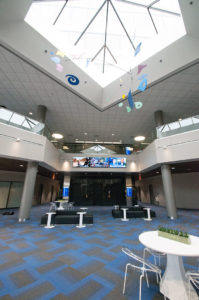
Attracting and retaining employees in an increasingly tight labor market is a key challenge for employers today. In 2018, 44% of employers will be looking to hire full-time, permanent employees and 51% plan to hire contingent workers, according to CareerBuilder’s employment forecast. But 45% of employers say they can’t find qualified people to fill their job openings, and for 58% of them, job vacancies last for three months or more.
Office building owners and managers know that helping their tenants attract the talent they need with targeted, cost-effective amenities has become a vital component of their business model. Increasingly, real estate decisions are based on how well the office space and surrounding area provide the type of authentic work and living experiences that today’s workers, especially younger ones, expect.
“When I’m working with a client today, it’s critical to know their business and the type of employees they have, so we can determine what amenities are most appropriate for their needs,” said Sheldon Oppermann, Executive Vice President for Compass Properties. “We think a company’s office space should reinforce its brand, help their employees be more productive, and help them attract and retain talent.”
Oppermann says the company’s CityCenter@735 building in Milwaukee offers a wide range of amenities that are aligned with these goals– everything from car service to bike storage, concierge and pet friendly spaces to high speed WIFI. “We are right on the banks of the Milwaukee River, so we even offer our tenants use of our Conference Room 3 – a pontoon boat they can use for meetings and networking events,” Oppermann added.
Many job candidates today, especially Generation X and Millennials, carefully consider a company’s social and environmental commitment when choosing an employer. In response, companies view their sustainability commitment as an increasingly important part of attracting and retaining top talent. In 2011, 20 percent of Fortune 500 companies published sustainability reports. By 2015, 81 percent did. It’s not surprising that most companies today consider a building’s energy efficiency early on in the rental process.
“We work hard to make sustainability a strong part of our culture,” said Todd Greenwald, Madison Property Manager for Compass Properties. “For all our properties, we set out with 3 goals in mind: reduce waste, encourage healthy lifestyles, and implement energy saving programs.”
Greenwald noted that Compass Properties recently completed the installation of a commercial solar panel system on the roof of its Park West II office building, located in Madison’s University Research Park. The system is expected to produce 27,600 kWh of power and energy savings of $4,600 per year.
Recently there has been a flurry of reports on how natural elements can promote health, wellbeing and productivity. Daylight is also consistently named by employees as one of the most coveted natural element in the workplace. These studies suggest that tenants and building owners need to be more strategic in sharing the daylight amenity in the workplace. Not just for productivity benefits, but also for the health and wellbeing of all staff.
“We look to expand or enhance the amount of natural light available to workers in all of our office space renovations,” says Mark Craig, General Manager of Compass Properties in Central Wisconsin. “In our view, natural lighting can play a big role in creating a healthy company culture. For example, when we renovated our CitySquare Office Center recently, the tenant/employee amenities we added included a new kitchen, gym, bike storage, and increased natural light throughout the building.”
To remain competitive in today’s tight labor market, companies need to take building amenities into consideration when leasing or renovating office space and focus on those that reinforce their brand, create a culture where their people want to work, and help them attract and retain talent.








Leave A Comment